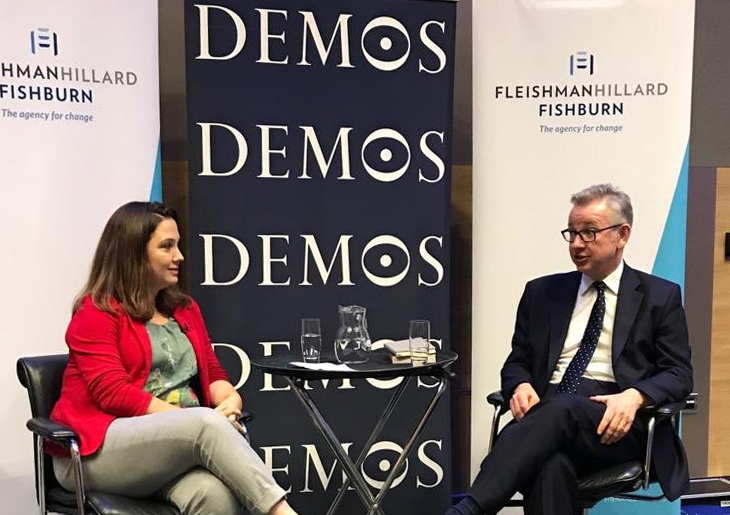Four things we learned from Michael Gove

From heroically battling plastics to admiring Kentucky Fried Chicken, FHF was privileged to host an intimate conversation with Environment Secretary Michael Gove at an event co-hosted with Demos at this year’s Conservative Party Conference.
Gove outlined at length how he is working alongside several departments to promote his reformist environmental agenda, which has been just as influential on current Conservative thinking as his previous command of education and justice. He also gave a clear defence of his approach to Brexit, affirming that the UK would remain a leading player on the global stage.
Here are a few details of what he told us:
- He’s a huge fan of David Attenborough
Gove was absolutely certain that the renewed public interest in the environment and climate has occurred due to the influence of David Attenborough’s programmes, singling out his ‘Blue Planet’ series in particular. He also praised the BBC’s recent programme on ocean plastics, stating that this is a vivid crisis that has captured the attention of the young and galvanised everybody to contribute, for example through the plastic bag charge.
Gove claimed that the British are especially connected to the sea and fishing, linking it to the UK’s maritime history and traditions. In turn, he said that the public want to see our coastal communities, seas and rivers be sustainably managed for future generations.
- He doesn’t like banning things but said that the state needs to do more
Whilst admitting that liberals and progressives have led the way on environmental issues, Gove stressed that Conservatives like himself have become “enthusiastic followers”. Whilst recognising the key role of government, he said this must be balanced with individual freedom and responsibility. He said he was generally not in favour of banning, linking this approach to the plastic bag charge and wider government policies, such as the soft drinks industry levy.
- The Treasury is planning further environmental measures
Gove acknowledged that some plastics are harder to recycle than others, revealing that he was working with the Treasury to develop thoughtful policies which take different approaches for different products. He said that phasing out plastic straws and cotton buds would be a “down payment on a more comprehensive approach in future” and that Treasury thinking is geared towards people taking consequences for using certain types of plastic packaging over others.
Gove praised his ministerial colleague Claire Perry for playing a pivotal role in linking his department’s environmental agenda to the wider remit of the Department for Business, Energy and Industrial Strategy. He said that innovation in recycling will keep costs lower for consumers in the long term and referred to the example of low emissions car technology and how that could benefit air quality and pollution levels.
Gove also said that local government is implementing too many recycling schemes. He said we should give up on trying to recycle certain plastic products that are almost impossible to do so. He readily dismissed rumours from the audience that he would target products such as nappies and KFC buckets, jokingly adding that he was a personal fan of the Zinger. On a more serious note, he said that a review of DEFRA’s agenda will take place after the Budget with measures likely to address textiles and polyester fibres. So watch this space!
- Brexit will empower the environment, not diminish it
Gove told the audience that he doesn’t believe that Brexit will diminish British sovereignty on environmental issues, stressing that the UK has been a leader in the Commonwealth Oceans Alliance and would continue to belong to other major international organisations and institutions. He said that the UK has a pivotal role to play as the world’s fifth largest economy, taking on developing countries such as China but also reaching out to fashion industry giants about tackling plastic microfibres in their clothing lines.
He expressed no regrets about Brexit at all, singling out the Environment, Food and Rural Affairs Committee’s recent ‘Health and Harmony’ inquiry and its criticisms of the EU’s common agricultural and fisheries policies.
Whilst the campaign for a second referendum had surprised him in terms of support, Gove said he respects it as a legitimate cause with serious supporters. He claimed that nobody really campaigned for a no-deal outcome and hinted that Theresa May might be willing to reconsider her present support for the Chequers proposals if public opinion were to shift. We shall find out soon enough…
Richard Black, Public Affairs
Find Out More
-
Platinum CMS Award
March 13, 2024
-
Changing Communications Tack at Mobile World Congress
February 21, 2024


